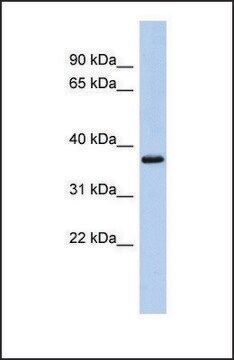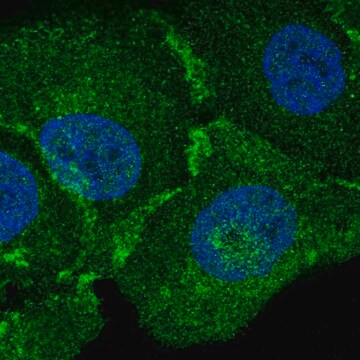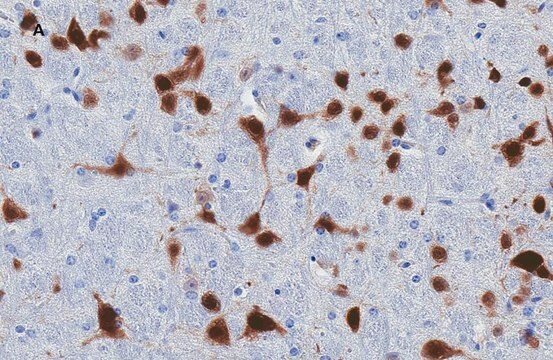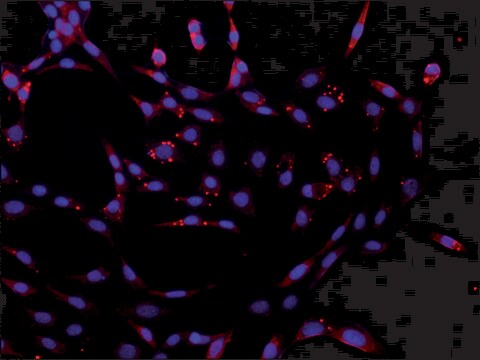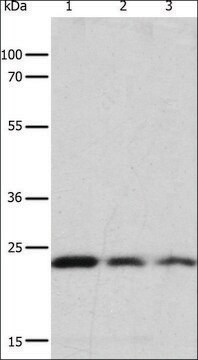推荐产品
生物源
rabbit
品質等級
共軛
unconjugated
抗體表格
affinity isolated antibody
抗體產品種類
primary antibodies
無性繁殖
polyclonal
形狀
buffered aqueous solution
分子量
antigen ~150 kDa
物種活性
human
濃度
~1.0 mg/mL
技術
immunoprecipitation (IP): 5-10 μg using ysates of HEK-293 cells over expressing human EDC4
indirect immunofluorescence: 2-5 μg/mL using paraformaldehyde fixed NIH-3T3 cells over expressing human EDC4
western blot: 0.5-1 μg/mL using lysates of HEK-293 cells over expressing human EDC4
UniProt登錄號
運輸包裝
dry ice
儲存溫度
−20°C
目標翻譯後修改
unmodified
基因資訊
human ... EDC4(23644)
mouse ... Edc4(234699)
rat ... Edc4(361399)
一般說明
Enhancer of mRNA-decapping protein 4 (EDC4), also known as human enhancer of decapping large subunit (HEDLS) or Ge-1, is characterized with an N-terminal WD40 repeat and a C-terminal domain which interacts with mRNA-decapping enzyme subunit 2 (Dcp2), and mediates EDC4 oligomerization and P-body localization .
The EDC4 gene maps on human chromosome 16q22.1.
特異性
Anti-EDC4 (N-terminal) specifically recognizes human EDC4.
應用
Anti-EDC4 (N-terminal) antibody has been used in:
- immunoprecipitation
- immunofluorescence
- immunoblotting.
生化/生理作用
Human enhancer of mRNA-decapping protein 4 (EDC4) associates with hDcp2 and stimulates hDcp2 activity in vitro as well as mediating the interaction between mRNA-decapping enzyme subunit 1 & 2 (DCP1 and DCP2).
Interaction of processing-body components, EDC4 and Dcp1a is essential for the post-transcriptional regulation of interleukin (IL)-6.
外觀
Solution in 0.01 M phosphate buffered saline, pH 7.4, containing 15 mM sodium azide.
儲存和穩定性
Store at –20 °C. For continuous use, the product may be stored at 2–8 °C for up to one month. For extended storage, freeze in working aliquots at –20 °C. Repeated freezing and thawing is not recommended. Storage in “frost-free” freezers is also not recommended. If slight turbidity occurs upon prolonged storage, clarify the solution by centrifugation before use. Working dilutions should be discarded if not used within 12 hours.
免責聲明
Unless otherwise stated in our catalog or other company documentation accompanying the product(s), our products are intended for research use only and are not to be used for any other purpose, which includes but is not limited to, unauthorized commercial uses, in vitro diagnostic uses, ex vivo or in vivo therapeutic uses or any type of consumption or application to humans or animals.
未找到合适的产品?
试试我们的产品选型工具.
儲存類別代碼
10 - Combustible liquids
閃點(°F)
Not applicable
閃點(°C)
Not applicable
A human microprotein that interacts with the mRNA decapping complex
D'Lima N G, et al.
Nature Chemical Biology, 13(2), 174-174 (2017)
Target-specific requirements for enhancers of decapping in miRNA-mediated gene silencing
Eulalio A, et al.
Genes & Development, 21(20), 2558-2570 (2007)
Jucimara Colombo et al.
Oncology reports, 21(3), 649-663 (2009-02-13)
Laryngeal squamous cell carcinoma is very common in head and neck cancer, with high mortality rates and poor prognosis. In this study, we compared expression profiles of clinical samples from 13 larynx tumors and 10 non-neoplastic larynx tissues using a
Nadia G D'Lima et al.
Nature chemical biology, 13(2), 174-180 (2016-12-06)
Proteomic detection of non-annotated microproteins indicates the translation of hundreds of small open reading frames (smORFs) in human cells, but whether these microproteins are functional or not is unknown. Here, we report the discovery and characterization of a 7-kDa human
Martin Fenger-Grøn et al.
Molecular cell, 20(6), 905-915 (2005-12-21)
Decapping is a key step in mRNA turnover. However, the composition and regulation of the human decapping complex is poorly understood. Here, we identify three proteins that exist in complex with the decapping enzyme subunits hDcp2 and hDcp1: hEdc3, Rck/p54
我们的科学家团队拥有各种研究领域经验,包括生命科学、材料科学、化学合成、色谱、分析及许多其他领域.
联系技术服务部门